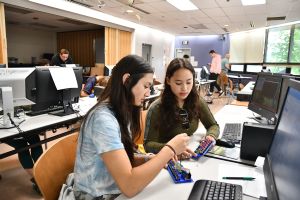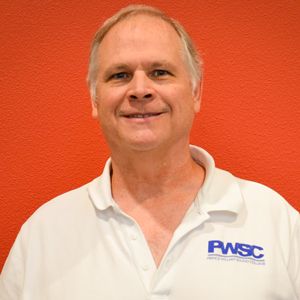
Alaska Tech Learners (ATL), an Advanced Technological Education project that prepares rural Alaska students to become technician-level web engineers, is growing in multiple directions.
Seventy-six students participated in the asynchronous, dual enrollment program in spring 2022. In early June two more high school teachers joined the current group of four high school teachers who participate in the “shared teaching model” for offering ATL courses from Prince William Sound College at their high schools. The Alaska Tech Summer Camp for teens was fully booked with 20 students well in advance of its June 20 start.
In a recent STEM for All presentation, ATL Principal Investigator Steve Johnson summarized the six-course, 16-credit ATL program that he teaches via movies that are loaded onto thumb drives along with labs and study guides. The thumb drives are mailed to students’ homes, putting the students in control of when they learn and avoiding the hefty cost and time that would be involved in downloading the 6 gigabyte file for each week’s class via internet servers.
“I think this [model for delivery] could be used anywhere, particularly rural [places] because urban settings you wouldn’t need to go through some of these hoops. I think anyone in the Western half of the United States could do the same thing fairly easily,” he said in a recent interview.
Alaska Tech Learners is one of 33 projects featured in ATE Impacts 2022-2023.
Alaska Themes Woven Into ATL
All the ATL instructional content is Alaska themed so that the rural students, who are mostly Native Alaskans, are learning with examples that are relevant to them and their future employers who are most likely to be Native Alaskan corporations, non-profits, and various types of government agencies.
For the teachers’ professional development, Johnson uses place-based pedagogy, such as fish run data and global positioning system plotting of routes between remote villages, so that the teachers’ lessons fit the traditional focus of students’ lives. Twenty-five teachers who teach information technology and usually one or more STEM subjects have participated in the summer workshops that Johnson has offered with ATE grant support to improve the quality of computer science instruction in Alaska high schools.

From this group, six have taken on the larger commitment involved in the ATL shared teaching model.
Johnson has purposefully structured the entire program to align with how Native Alaskans have historically learned specific life skills from Elders who teach youngsters in small groups or one-one-one.
“The amount of time it took to do something was not important. Mastery of the skills was important. You can’t earn a B in survival, food gathering, or food processing and expect to live. When teachers use place-based instruction they can get out of that purely Western model of mass learning and industrial education and get more into the model that they [students] grew up in as little kids,” he said.
In the ATL model, Johnson provides the theory-based instruction with the thumb-drive movies that students can access whenever it fits their schedules, repeating and rewinding sections as necessary. The teachers who participate in the shared teaching model blend this content with their own lessons.
Prince William Sound College in Valdez is an extended campus of the University of Alaska Anchorage. To meet the university’s standards for college credit, the ATL students are expected to view the movies, do the applied laboratory assignments that they submit for Johnson to grade, take a weekly quiz online, and write weekly posts on the discussion boards of each course they are taking.
ATL Students Are 10% of College's Enrollment
This spring’s ATL cohort of 76 students shows just how asynchronous the ATL program is.
Thirty-eight of the students were enrolled in the university’s College of Engineering. Johnson says these students report being happy with their computer science programs but are aware that employers look for specific skills. Being able to show that they have practical web engineering skills enhances their career options.
About half of the remaining 38 students are home schooled, and most of the remaining students are taking the ATL courses alone or with just a few other students on their own in remote high schools. Even when high school teachers facilitate the ATL courses at public high schools the classes are very small, ranging in size from two to 10 students.
“One hundred eighty-eight students by New York City standards isn’t much, but it’s 10% of Prince William Sound’s total enrollment,” Johnson said in an interview. He reported that in addition to the 76 ATL students in the spring semester there were 67 in fall 2021 and 45 in the summer.
“Tech learners is very transformational,” he said, explaining that since the program started with ATE support in 2018 it has shown there is demand for dual enrollment STEM programs and has provided a process for the developing a “middle college for the middle of Alaska.”
Johnson is currently seeking funds to expand the professional development program and create a residential, intense 12-week, middle college program at Prince William Sound College. Johnson is the college’s computer science professor, director of Academic Affairs, and grant writer.
His plan for the middle college is to have the high school students reside on campus in Valdez for 12 weeks during the regular fall or spring semesters. He wants the students to take intense information technology courses in the morning and communications and graphics art classes in the afternoons.
“I want them to take persuasive writing or technical writing to building toward a web engineering degree,” he said.
COVID interfered with Johnson’s in-person recruiting of ATL high school educators, but he is proud of what he’s been able to accomplish and the enrollment growth that ATL has sparked at Prince William Sound College. And he wants to build on that.

 Subscribe
Subscribe


 See More ATE Impacts
See More ATE Impacts

Comments
There are no comments yet for this entry. Please Log In to post one.